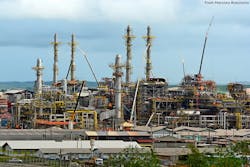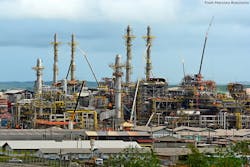Petrobras cleared to boost crude runs at Rnest
Petroleo Brasileiro SA (Petrobras) has received approval from state regulators to lift crude oil throughputs to levels nearing full design capacity at the first 115,000-b/d production train of its Abreu e Lima refinery (Rnest) at the port of Suape, near Recife, the capital of Brazil’s Pernambuco state.
Pernambuco’s Agencia Estadual de Meio Ambiente (CPRH), the state’s environmental agency, issued a renewal of Rnest’s operating license on Jan. 11, the terms of which allow the refinery’s first crude distillation unit (CDU) to process as much as 100,000 b/d.
The newly renewed license, valid through Jan. 10, 2017, follows an initial operating permit issued in December 2014 that limited the CDU’s crude processing capacity to 74,000 b/d, or about 64% of its nameplate capacity (OGJ Online, Dec. 5, 2014).
While the new license allows Rnest to operate before completing installation of its U-93 emissions abatement unit (SNOX), it also stipulates the refinery must process crudes that are lower in sulfur than the heavier, high-sulfur crude for which the plant was designed.
In addition to a host of reporting requirements, Petrobras must meet certain progress deadlines with regard to implementation of Rnest’s SNOX unit, as well as its central waste system, according to the license.
Early in 2015, Petrobras commissioned the first of Rnest’s two 75,000-b/d delayed coking units, as well as an 82,000-b/d diesel hydrotreater as part of the refinery’s Phase 2 startup (OGJ Online, Mar. 19, 2015; Mar. 13, 2015).
Once fully operational, Rnest will have the capacity to process 230,000 b/d of 16° gravity oil for the production of mainly low-sulfur diesel, but petroleum coke, LPG, and heavy coker gas oil, as well as naphtha.
Originally scheduled for startup last year, a firm timeline for commissioning of Rnest’s second phase remains unclear.
Contact Robert Brelsford at [email protected].

